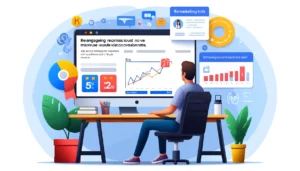Can I do Google Ads myself? Navigating Google Ads on Your Own: A Guide to DIY Campaign Management

If you have found yourself asking the question: Can I do Google Ads myself? Hopefully, this guide will help you out!
Running Google Ads campaigns can be an effective way to drive targeted traffic to your website or online business. While many opt for professional help, managing your own campaigns is not only possible but also provides full control and potential cost savings. This guide offers insights into navigating Google Ads by yourself, from setting up an account to optimising and analysing your campaigns for the best performance. You won’t be as good as a professional team of experts at the top Google Ads agencies but at least you will be able to get started. We would always recommend employing the best people you can afford, this is especially true for Google Ads due to the possibility of negative results and wasting your ad spend.
Key Takeaways
- Understanding the fundamentals of Google Ads is crucial for effective campaign management.
- Setting up your Google Ads account properly sets the foundation for successful advertising.
- Crafting your first campaign involves selecting the right type, writing compelling ad copy, and setting appropriate bids.
- Regular optimisation of campaigns is necessary to improve performance and leverage advanced features like ad extensions and machine learning.
- Effective budget management and data analysis are key to maximising ROI and making informed decisions.
Understanding the Basics of Google Ads
Defining Google Ads and Its Importance
Google Ads, a robust Pay-Per-Click (PPC) platform, allows you to display ads to potential customers actively searching for what you offer. This direct approach to advertising is crucial because it connects you with your audience at the moment they are ready to make a purchase, thereby increasing the likelihood of conversion. Understanding this tool is essential for leveraging its full potential to meet your business goals.
Key Components of Google Ads
The structure of Google Ads is designed to maximise your advertising efficiency. Key components include campaigns, ad groups, and ads themselves, each playing a pivotal role in targeting the right customers. By mastering these elements, you can craft more effective campaigns that speak directly to your audience’s needs and desires.
How Google Ads Auction Works
Every time someone searches on Google, an auction determines which ads appear based on factors like bid amount and ad quality. The process is dynamic, ensuring that only the most relevant ads reach potential customers. Familiarising yourself with this auction system is crucial for optimising your bids and maximising your ad performance.
Setting Up Your Google Ads Account
Creating an Account
To begin, navigate to Ads.Google.Com and click the bold, blue “Start now” button. If you have an existing Google account, such as Gmail, it will automatically be linked to your new Google Ads account. This integration simplifies the management of your advertisements and ensures that all your Google services are interconnected.
Navigating the Google Ads Dashboard
Once your account is set up, you’ll be directed to the Google Ads dashboard. This is your command centre, where you can view performance metrics, manage campaigns, and access advanced settings. Familiarise yourself with the layout and tools available to you. The dashboard is designed to give you a comprehensive overview of your advertising activities at a glance.
Setting Your Advertising Goals
Setting clear advertising goals is crucial for the success of your campaigns. Decide what you want to achieve: whether it’s increasing website traffic, generating leads, or boosting sales. Each goal will dictate different settings and strategies, so it’s important to be clear and specific about your objectives from the start.
Can I do Google Ads myself? Crafting Your First Campaign
Choosing the Right Campaign Type
Selecting the appropriate campaign type is crucial for the success of your Google Ads. Consider your business goals and the nature of your target audience. For instance, a Search campaign might be ideal if you’re looking to drive traffic, while a Display campaign could be better for brand awareness. Choose wisely, as this forms the foundation of your advertising efforts.
Writing Effective Ad Copy
The power of your campaign lies in the ad copy you craft. It should be compelling, clear, and directly aligned with your campaign goals. Remember, the right message can significantly boost your click-through rates and overall campaign performance. Use A/B testing to refine your messages and find what resonates best with your audience.
Setting and Adjusting Bids
Setting the right bids is a balancing act between budget constraints and desired visibility. Start with a conservative bid and adjust based on the performance data you gather. Utilise automated bidding strategies to optimise your bids in real time, ensuring you’re not overspending while still capturing valuable ad space.
Optimising Your Campaigns for Better Performance
Using Keywords Effectively
To truly optimise your Google Ads campaigns, focus on identifying and utilising top-performing keywords. Start by analysing your campaign data to see which keywords are driving the most conversions. Incorporate these keywords into your ad copy and landing pages to enhance relevance and improve your Quality Score. Remember, a higher Quality Score can lead to lower costs and better ad positions.
Monitoring and Adjusting Campaigns
Regular monitoring of your campaigns is crucial. Review performance metrics frequently to understand what’s working and what isn’t. Adjust your bids, ad copy, and targeting based on performance data to continuously improve results. Utilise budget pacing insights to optimise your spending throughout the campaign duration.
Leveraging Ad Extensions
Ad extensions are a powerful tool to improve your ad visibility and increase click-through rates. Experiment with different types of ad extensions like site links, callouts, and structured snippets. Tailor these extensions to match your PPC management goals and provide additional information that can persuade users to click your ads.
Advanced Google Ads Strategies
Utilising Remarketing Tools
Can I do Google Ads myself? Remarketing is a powerful strategy to re-engage users who have previously interacted with your website. By strategically placing your ads in front of these audiences, you can increase the chances of conversion. Start by creating remarketing lists in Google Ads, then tailor your ads to speak directly to the needs and interests of this group. Ensure your ads are relevant and engaging to maximise return visits.
Exploring Different Ad Formats
The effectiveness of your Google Ads campaign can significantly increase by diversifying your ad formats. Experiment with text, images, videos, and responsive display ads to find what resonates best with your target audience. Use A/B testing to measure the performance of different formats and refine your approach based on the data collected. Remember, aligning ad content with your landing page content can boost your Quality Score and reduce your CPC.
Incorporating Machine Learning
Leverage the power of machine learning to optimise your Google Ads campaigns. Google’s algorithms can help predict bidding strategies, suggest optimal ad placements, and even identify potential new markets. Regularly review the recommendations provided by Google and test changes to continually improve campaign performance. By embracing these advanced technologies, you position your campaigns to achieve better results and stay ahead in the competitive PPC landscape.
Managing Your Budget Effectively
Understanding Budget Allocation
Allocating your budget effectively is crucial for the success of your Google Ads campaigns. Start by understanding how much you’re willing to spend on each campaign and set limits to ensure you don’t exceed your overall marketing budget. Divide your budget based on campaign performance and adjust as necessary, keeping in mind that you’re not just paying for clicks, but for valuable data that informs your strategy.
Tips for Cost-Effective Campaigns
To achieve cost-effective campaigns, monitor your ad spending closely and make adjustments to your bids based on performance data. Utilise tools like Google Ads’ built-in analytics to identify underperforming ads and redirect funds to those that generate better returns. Remember, spending more isn’t always the answer; spending smarter is.
Avoiding Common Financial Pitfalls
Be wary of common financial pitfalls such as setting and forgetting your ad budget. Regularly review your campaign results and be prepared to tweak your budget based on what the data tells you. This proactive approach helps you avoid wasting money on ineffective ads and ensures your budget is always aligned with your campaign goals.
Analysing Campaign Data
Interpreting Google Ads Analytics
Can I do Google Ads myself? To truly harness the power of your Google Ads campaigns, you must become proficient in interpreting the analytics. Start by focusing on key metrics such as click-through rates, conversion rates, and cost per acquisition. Understanding these figures will help you gauge the effectiveness of your campaigns and pinpoint areas for improvement. Regularly check the ‘Conversions’ segment in your Google Ads dashboard to track performance against your goals.
Making Data-Driven Decisions
The ability to make data-driven decisions is crucial in optimising your PPC campaigns. Analyse trends over time to understand the impact of your adjustments. Use this data to refine your targeting, bidding strategies, and ad copy. Remember, every change should be backed by data to ensure it contributes positively to your campaign goals.
Learning from Campaign Insights
Gaining insights from your campaigns is an ongoing process. Each campaign provides valuable lessons that can refine your future strategies. Pay special attention to the performance of different demographics, locations, and devices. This will help you tailor your future campaigns to be more effective and cost-efficient. Utilise a PPC audit to systematically review and enhance your campaign strategies, ensuring continuous improvement and better alignment with your business objectives.
Conclusion
Can I do Google Ads myself? Navigating Google Ads on your own can be a rewarding yet challenging journey. By taking a DIY approach, you gain full control over your campaigns, allowing you to tailor them precisely to your business’s unique needs and goals. However, it’s crucial to continuously educate yourself and stay updated with Google’s best practices to ensure your efforts lead to success. Remember, while the learning curve might be steep, the potential cost savings and deep insights gained from managing your campaigns firsthand can significantly benefit your business. Embrace the challenge, and you may find that mastering Google Ads is not only possible but profoundly empowering.
The Frequently Asked Questions on if ‘I Can do Google Ads myself?’
What are the key components of Google Ads?
The key components of Google Ads include the ad campaigns, ad groups, ads, keywords, and bidding strategies. Each component plays a crucial role in the setup and success of your advertising efforts.
How does the Google Ads auction work?
The Google Ads auction determines ad placement based on the maximum bid and Quality Score of each ad. When a user performs a search, Google runs an auction to decide which ads to display, their order, and the cost per click.
What should I consider when setting my advertising goals?
When setting advertising goals, consider what you aim to achieve, such as increasing brand awareness, generating leads, or driving sales. Set specific, measurable, achievable, relevant, and time-bound (SMART) goals to guide your campaign strategy.
How can I use keywords effectively in my campaigns?
To use keywords effectively, research relevant and high-volume keywords, organise them into focused ad groups, and continuously refine them based on performance data. Utilise match types to control who sees your ads based on their search queries.
What are ad extensions, and how can they improve campaign performance?
Ad extensions provide additional information and links in your ads, such as contact information, additional webpage links, or product highlights. They enhance your ads’ visibility and click-through rates by offering more valuable information to users.
What are some tips for managing my Google Ads budget effectively?
To manage your Google Ads budget effectively, start with a clear budget based on your financial constraints and campaign goals. Regularly review your spending, adjust bids to optimise cost-per-click, and experiment with different strategies to find the most cost-effective approach.
Author
Search Blog
Free PPC Audit
Subscribe to our Newsletter
The Voices of Our Success: Your Words, Our Pride
Don't just take our word for it. With over 100+ five-star reviews, we let our work-and our satisfied clients-speak for us.
"We have been working with PPC Geeks for around 6 months and have found Mark and the team to be very impressive. Having worked with a few companies in this and similar sectors, I rate PPC Geeks as the strongest I have come across. They have taken time to understand our business, our market and competitors and supported us to devise a strategy to generate business. I value the expertise Mark and his team provide and trust them to make the best recommendations for the long-term."
~ Just Go, Alasdair Anderson




